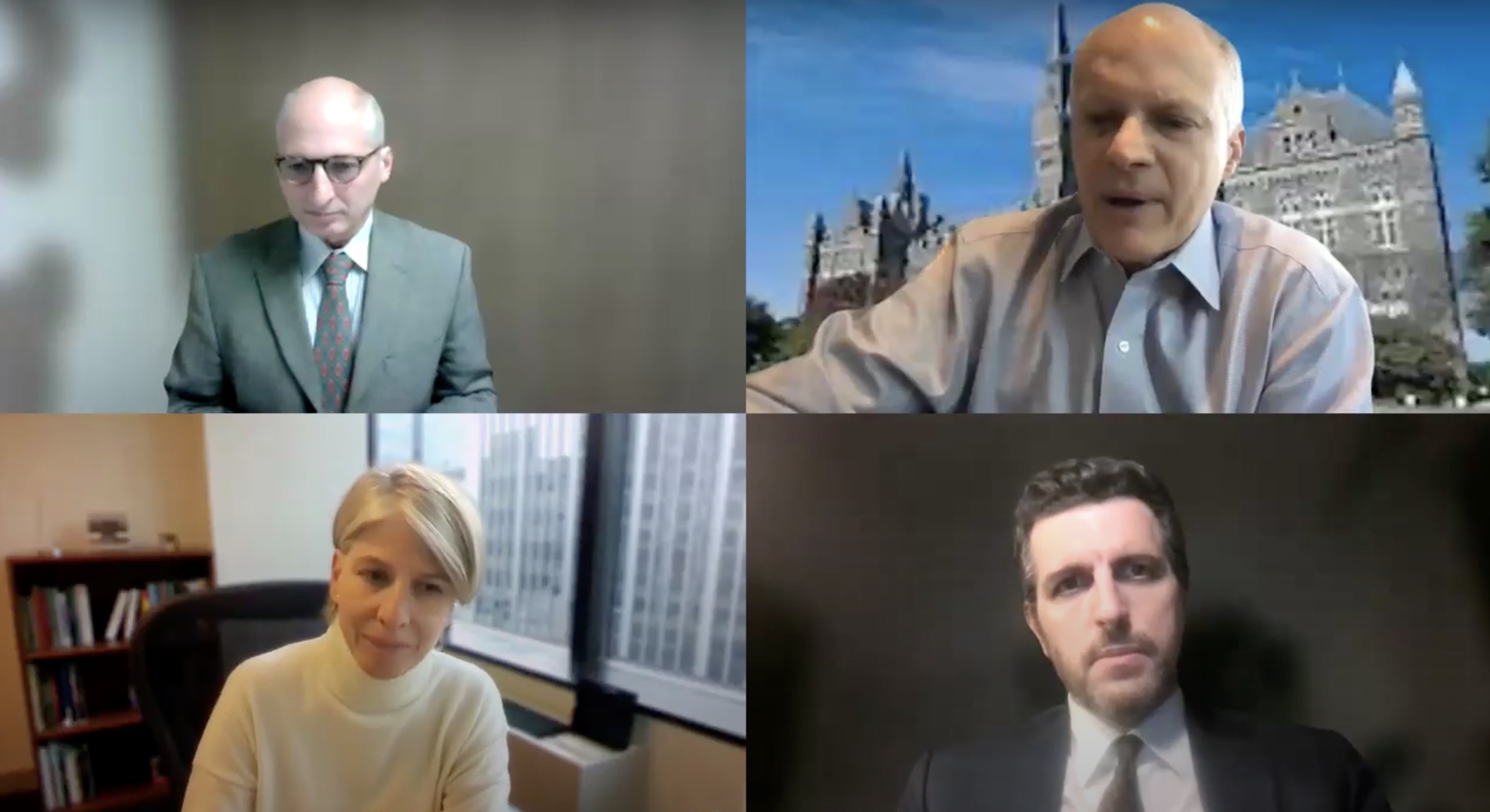The Challenges of Money Laundering and the Role of Data in Combatting Financial Crime
On January 21, 2025, the Georgetown Americas Institute and Transcrime - Università Cattolica del Sacro Cuore hosted the second of three virtual seminars focused on money laundering, regulatory frameworks, and financial crime in Latin America.
The event featured Michele Riccardi, deputy director at Transcrime - Joint Research Center on Innovation and Crime of the Università Cattolica del Sacro Cuore, for a discussion on fragmented data, corporate transparency, and the importance of improving regional cooperation to combat financial crime effectively. The event was introduced by GAI Founding Director Alejandro Werner and moderated by Marcela Meléndez from the World Bank and Roberto Michele, formerly of the Inter-American Development Bank.

Data Fragmentation and Regional Challenges
Meléndez highlighted the challenges Latin America faces in collecting and sharing data among agencies, which obstructs efforts to combat money laundering effectively. She pointed out that, while regulations are evolving, the core issue lies in the infrastructure and capacity to utilize available data for detecting illicit financial flows.
Riccardi agreed, noting that while European countries have established regulations around corporate transparency, these are not always harmonized, and data is often managed by different entities. This fragmentation complicates cross-border efforts to trace money laundering activities. Riccardi emphasized the need for better coordination of data gathering and stronger integration of public and private sector information to improve the effectiveness of financial crime investigations.
Corporate Transparency and Beneficial Ownership
The conversation also touched on corporate transparency, particularly regarding beneficial ownership registries, and its connection to anti-money laundering (AML) measures. Meléndez pointed out that Latin America is still in the early stages of implementing effective corporate transparency initiatives. She noted that many countries in the region struggle with establishing ownership registries, which are crucial for combating money laundering. Riccardi acknowledged the importance of these registries and emphasized that, alongside ownership registries, improving investigators’ and prosecutors’ capacity to follow complex financial transactions is critical.
Riccardi explained that even with the best data, without skilled professionals to interpret and act on it, progress would be limited. He stressed that corporate transparency could help identify illicit financial activities but is not enough on its own, especially in Latin America, where these systems are still under development.
The Role of Capacity Building and Academia
Riccardi emphasized that the success of anti-money laundering efforts depends largely on the skills of those tasked with enforcement. He highlighted the need for specialized training for prosecutors, investigators, and financial professionals as essential to handle the increasingly sophisticated tactics used by money launderers.
Meléndez noted that in Latin America, there is a gap between the policies in place and their effective implementation. She suggested that collaboration between academic institutions and government agencies could help bridge this gap. Riccardi underscored that academia could play a crucial role in providing training and identifying gaps in regulatory and enforcement frameworks.
Vulnerable Sectors and Subcontracting
Riccardi also identified vulnerable sectors to money laundering, such as construction, waste management, and retail as prime examples. These industries often involve complex subcontracting chains that make tracking illicit activities difficult. He explained that criminal organizations tend to operate in the middle of these supply chains, rather than at the top, complicating detection.
Furthermore, Riccardi mentioned the rise of e-commerce and logistics industries, which introduce new vulnerabilities, particularly in international trade. As these sectors grow, so does the potential for money laundering, especially with cross-border transactions. In these industries, subcontracting presents a critical risk, as criminals can easily conceal illicit activities behind seemingly legitimate business operations.
“Subcontracting stresses the importance for private firms and not only trade banks and other AML entities to be able to monitor the risk of their supply chain and their third parties.”-Michele Riccardi.
International Cooperation and Regional Collaboration
The importance of international cooperation in fighting money laundering was also discussed. While Riccardi recognized the progress made in global cooperation, he noted that Latin America faces unique challenges in fostering cross-border collaboration. He pointed to the differences in legal frameworks, data-sharing practices, and institutional capacity that have delayed the development of regional cooperation networks in Latin America.
Riccardi suggested that, for Latin America to combat money laundering more effectively, the focus should initially be on improving local cooperation networks. Strengthening regional cooperation would facilitate data and intelligence sharing across borders, which is crucial to address the region’s challenges. He emphasized that while global cooperation is important, regional networks often provide more tailored and effective solutions.
Q&A Session
During the Q&A session, Meléndez asked Riccardi to elaborate on the obstacles agencies face when exchanging data across borders. Riccardi explained that while some international efforts to improve cooperation exist, bureaucratic and institutional barriers remain significant. He argued that technology, such as artificial intelligence and data analytics, could play a key role in improving data-sharing systems, enabling more effective identification of illicit financial flows.
The panelists also discussed the importance of public-private partnerships in strengthening financial crime prevention. Riccardi urged governments to collaborate more closely with the private sector to better understand the risks and vulnerabilities in financial systems. He concluded by reiterating the need for continued academic involvement, calling on scholars to contribute to the development of more effective regulatory frameworks.
